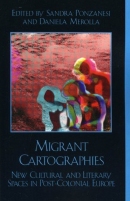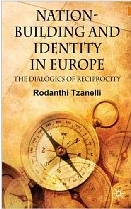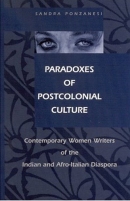
|
image copyright © Matt Kenyon |
|
Selected publications
John Mcleod, Postcolonial London: Rewriting the Metropolis (Routledge, 2004)
[buy from Amazon]
Postcolonial London explores the imaginative transformation of London by African, Asian, Caribbean and South Pacific writers since the 1950s.
 Sandra Ponzanesi and Daniela Merolla eds, Migrant Cartographies: New Cultural and Literary Spaces in Post-Colonial Europe (Lexington Books 2005)
Sandra Ponzanesi and Daniela Merolla eds, Migrant Cartographies: New Cultural and Literary Spaces in Post-Colonial Europe (Lexington Books 2005)
[buy from Amazon]
In recent years, Europe has had to constantly rethink and redefine its attitude toward new flows of immigrations. Migrant Cartographies examines both sites and conflicts and the way in which forms of belonging and identity have been reinvented in migrant literatures in Europe.
Sandra Ponzanesi and Marguerite Waller eds, Postcolonial Cinema Studies. (Routledge, 2011). This collection of essays foregrounds the work of filmmakers in theorizing and comparing postcolonial conditions, recasting debates in both cinema and postcolonial studies. Postcolonial cinema is presented, not as a rigid category, but as an optic through which to address questions of postcolonial historiography, geography, subjectivity, and epistemology. Click here for more information
Sandra Ponzanesi and Bolette Blaagaard eds, Deconstructing Europe. Postcolonial Perspectives. (Routledge, 2011).
This book engages with the question of what makes Europe postcolonial and how memory, whiteness and religion figure in representations and manifestations of European ‘identity’ and self-perception. click here for more information
Michelle Keown, David Murphy, and James Procter eds, Comparing Postcolonial Diasporas (Palgrave Macmillan 2009)
[buy from Amazon]
An interdisciplinary collection which breaks new ground by moving the field of postcolonial diaspora studies beyond its current Anglophone bias to explore the links with other cultural contexts.
Rodanthi Tzanelli, The Cinematic Tourist: Explorations in Globalization, Culture and Resistance (Routledge 2007)
[buy from Amazon]
This book takes a closer look at the phenomenon of 'cinematic tourism', exploring audiences' perceptions of film and their covert relationship with tourist advertizing campaigns, alongside the nature of, and resistance to, newly-born tourist industries.
 Rodanthi Tzanelli, Nation-Building and Identity in Europe: The Dialogics of Reciprocity (Palgrave Macmillan, 2008)
Rodanthi Tzanelli, Nation-Building and Identity in Europe: The Dialogics of Reciprocity (Palgrave Macmillan, 2008)
[buy from Amazon]
This book shows how nationalism is a linguistic construction, focusing on the relationship between Britain and Greece in the late nineteenth century.
 Sandra Ponzanesi, Paradoxes of Postcolonial Culture: Contemporary Women Writers of the Indian and Afro-Italian Diaspora (State University of New York Press 2004)
Sandra Ponzanesi, Paradoxes of Postcolonial Culture: Contemporary Women Writers of the Indian and Afro-Italian Diaspora (State University of New York Press 2004)
Explores postcolonial discourse from the standpoint of feminism and writers in minority languages.
This innovative contribution to understanding the promise and contradictions of contemporary postcolonial culture applies a wide array of theoretical tools to a large body of literature. The author compares the work of established Indian writers including Bharati Mukherjee, Meena Alexander, Sara Suleri, and Sunetra Gupta to new writings by such Afro-Italian immigrant women as Ermina dell'Oro, Maria Abbebù Viarengo, Ribka Sibhatu, and Sirad Hassan.
Rodanthi Tzanelli, The 'Greece' of Britain and the 'Britain' of Greece: Performance, Stereotypes, Expectations and Intermediaries in 'Neohellenic' and Victorian Narratives (1864-1881) (VDM Verlag 2009)
[buy from Amazon]
The role Western philhellenism played in the production of modern Greek identity has been the object of extensive research. Scholars focused on the importance Hellenic culture acquired in European discourses of modernity and the maintenance of national and imperial self-images in the West. The present book re-conceptualises the historical emergence of such discursive frameworks as "gatekeepers" of hegemonic and counter-hegemonic projects.


